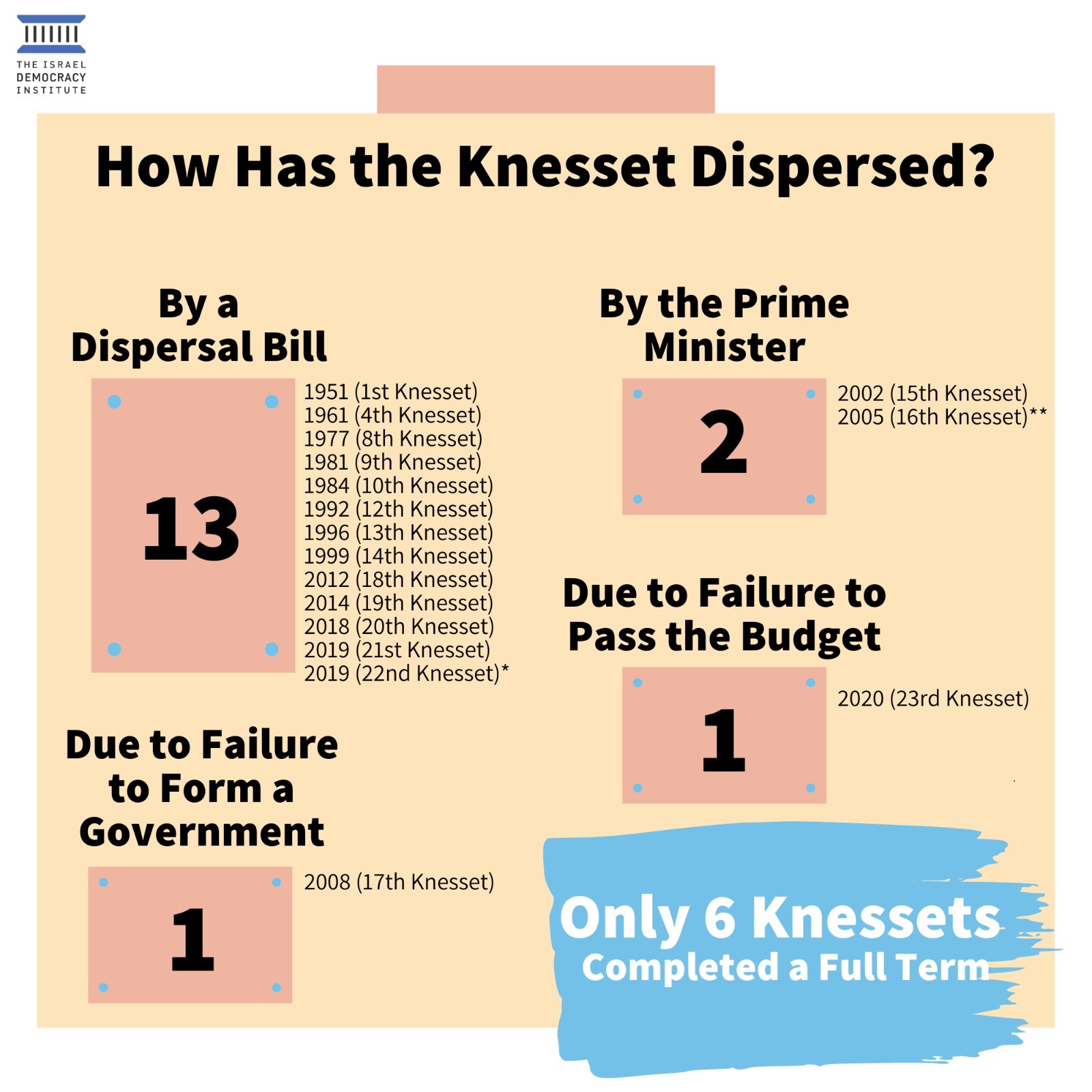Dissolving the Knesset: A Historical Survey
The Knesset might be dissolved before the end of its term – a phenomenon not unique to Israel, but rather common to almost every parliamentary democracy providing a degree of flexibility: that is, if the parliament and the government are unable to function effectively, early elections are called in order to form a new parliament and government that will be able to do so. Among the established democracies, only Norway has no provision for dissolving parliament before the end of its term.


In Israel, there are several paths for dissolving the Knesset and holding early elections:
1. The Knesset can vote to dissolve itself by means of a law enacted by a majority vote of its membership (34–35 of the Basic Law: The Knesset). This is a regular law and must pass three readings and pass the House Committee. In the case of a private bill - proposed by an individual MK, there is no need for 61 votes in favor on the preliminary reading, but rather-only in the three subsequent readings. Members of the opposition often submit private bills to dissolve the Knesset even when they lack a majority for passage, so that the bill can be called up for a vote, if and when such a majority coalesces. This is the situation today. MK Yoav Kish of the Likud has submitted a private bill to dissolve the 24th Knesset (3660/24/P); his party can call it up for a vote within its assigned quota of private bills.
2. The Knesset can be dissolved at the initiative of the Prime Minister, with the President’s assent (unless, within 21 days, at least 61 MKs request the President to assign the formation of a new Government to a Knesset member who has agreed to accept the mandate: 29 of the Basic Law: The Government).
3. The Knesset is dissolved automatically if it fails to enact the State Budget by the date specified by law (March 31, or 145 days after the formation of a new Government: 36 of the Basic Law: The Knesset).
4. The Knesset is dissolved automatically if it proves impossible to form a new government (after elections or following the Prime Minister’s resignation, death, or incapacity: 11 of the Basic Law: The Government).
Until 1996 (when the direct elections of the Prime Minister mechanism took effect), the only path available was for the Knesset to dissolve itself. Two new options were introduced after the elections in May 1996: dissolution by the Prime Minister and dissolution if the Knesset fails to pass the budget on time. These remained on the books after the direct-election mechanism was repealed, as part of the Basic Law: The Government, in 2001. This added another option: dissolution of the Knesset if a new government could not be formed.
How the Knesset has been Dissolved in the Past
Only six of the 23 Knessets completed their full term of office (the 2nd, 3rd, 5th, 6th, 7th, and 11th). In other words, only on six occasions were Knesset elections held at the scheduled time: 1955, 1959, 1965, 1969, 1973, and 1988. Every other Knesset was dissolved, and early elections were held (see table).
How 17 Knessets Met their Demise
| By a Law to Dissolve the Knesset | Dissolved by the Prime Minister | Dissolved automatically when a new Government was not formed | Due to failure to pass the State Budget |
| 1951 (1st Knesset) | 2002 (15th Knesset) | 2008 (17th Knesset) | 2020 (23rd Knesset) |
| 1961 (4th Knesset) | 2005 (16th Knesset)** | ||
| 1977 (8th Knesset) | |||
| 1981 (9th Knesset) | |||
| 1984 (10th Knesset) | |||
| 1992 (12th Knesset) | |||
| 1996 (13th Knesset) | |||
| 1999 (14th Knesset) | |||
| 2012 (18th Knesset) | |||
| 2014 (19th Knesset) | |||
| 2018 (20th Knesset) | |||
| 2019 (21st Knesset) | |||
| 2019 (22nd Knesset)* | |||
* The 21-day period in which a government could be formed in response to a request submitted to the President by 61 MKs expired on the night of December 11/12, 2019. Under the Basic Law: The Government, the President must inform the Speaker of the Knesset that no request of this nature had reached him; and that the Knesset would be dissolved automatically. However, early in the morning of December 12, before the President had provided this notification, the Knesset passed a law to dissolve the 22nd Knesset, advancing the elections for the 23rd Knesset by eight days, so that they would not fall on the Purim holiday
** Formally, the Knesset was dissolved by the Prime Minister, but in fact the process was the result of a compromise. Before the dissolution order was issued, the Knesset had passed on preliminary reading a bill to dissolve itself, with the support of more than 80 members. In the constitutional debate that ensued due to the fact that two parallel tracks were being taken simultaneously, it was decided that the Knesset would indeed be dissolved by the Prime Minister’s order, but the date of the new elections would be that approved by the Knesset in the preliminary reading.
As can be seen from the table, through 1996 the Knesset dissolved itself using the only mechanism available at the time —by means of a special law. Since the new mechanisms for dissolution were introduced, they have been cited five times, while the more frequently invoked mechanism whereby the Knesset dissolves itself has been invoked six times.
A Comparative Perspective
Other countries have their own mechanisms for dissolving parliament and holding early elections. In most of these democracies, the power to do so rests with the head of state (the monarch or president), in response to a request by the prime minister or the Government (e.g., Australia, Japan, New Zealand, Spain, Sweden, Ireland, Germany, and Finland; in some of them the head of state can decline the request, while in others - he or she serves only as a rubber stamp). As stated, Israel adopted this mechanism in 1996 and by so doing—came somewhat closer to other democracies. However, even today, there are several differences that are worth mentioning:
1. Dissolution of the Knesset if it fails to pass the State Budget is unique to Israel and cannot be found in any other democracy. Although this has occurred only once (the 23rd Knesset in 2020), it seems that the “threat” that the MKs will be sent packing if they do not pass the budget, has not achieved its purpose. Instead of making it easier to pass a budget and stabilize the system, it has frequently encouraged “extortion” by factions and individual MKs, and thereby undermined the coalition.
2. The Knesset’s ability to dissolve itself is relatively rare on the international scene; it can be found in Austria and, to a limited extent, in Great Britain, where it requires a two-thirds vote of the members of Parliament. This is by far the most significant difference between Israel and other countries, in light of the fact that most Knessets were terminated by this mechanism.
3. The head of state-that is, the President, plays a relatively limited role in dissolving the Knesset as compared to his peers in other countries. In many democracies (such as Italy, Iceland, the Netherlands, Luxembourg, Latvia, Finland and France), the head of state can dissolve parliament at his or her own initiative (The President of Israel cannot do so). In some countries (Ireland, Germany, Finland), the head of state can veto the prime minister’s or government’s request to dissolve parliament.
* The 7th Knesset is an exceptional case. The elections were scheduled to take place at the statutory time, but were postponed due to the Yom Kippur War. For our purposes, what is important is that the elections were not moved up, and so-- we can relate to them as if held on time.
** Assaf Shapira, “The Time has Come to Separate Passage of the Budget from Dissolving the Knesset,” IDI Website, July 30, 2020.
